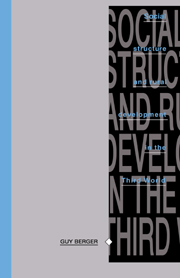5 - Social structure and failed development
Published online by Cambridge University Press: 17 September 2009
Summary
The social structure of progressive farmers and outgrowers
Development projects serve as a catalyst of class formation, the generation of class interests and the emergence of class-motivated activity (Steeves, 1978: 124). However, to elucidate the class character of ‘progressive farmers’, outgrowers and settlement scheme tenants is a complex issue, as is evident in a debate concerning the extent to which African and other agriculturalists are peasant or proletarian in character.
On the one side of the debate, Njonjo notes that almost 50 per cent of income to smallholders in Kenya's central province comes from wages and remittances. He asks whether this class is therefore a peasantry or a proletariat with patches of land (1981: 37). His judgement tends towards the proletarian characterisation, and it has come under fire for ignoring both the smallholders' domestic labour process and the question of ownership of land (Gutto, 1981: 44). Indeed, different conclusions have been reached by taking these two considerations into account. With regard to the domestic labour process, O'keefe (1984: 160) argues that this precludes proletarian status, even though in the village he studied, 44 per cent of smallholders depended on off-farm sources for more than half their income. While O'Keefe rejects calling these producers ‘farmers’ (likening them instead to a ‘lumpen rural proletariat-cum-peasantry’ functioning as a labour pool for capitalism), he stops short at calling this class a proletariat proper, reasoning that its members take part in wage-labour for the purpose of supporting their own rural family-based labour process.
- Type
- Chapter
- Information
- Social Structure and Rural Development in the Third World , pp. 107 - 140Publisher: Cambridge University PressPrint publication year: 1992



